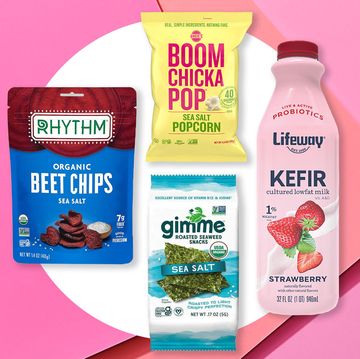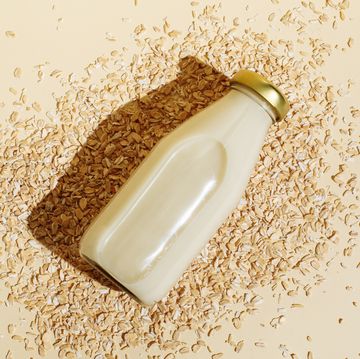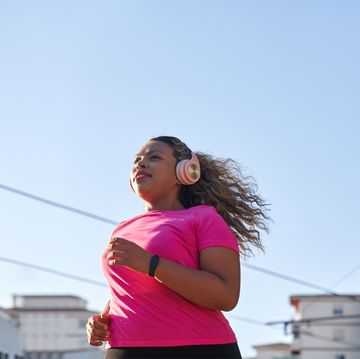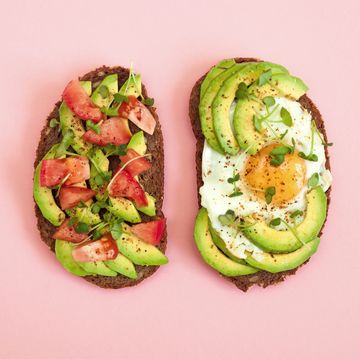How to Keep Your Morning Workout From Making You Want to Eat the World
Avoid these 5 mistakes to prevent a post-exercise binge.

Your alarm clock goes off at 6 a.m., and you’re out the door and off to the gym. Atta, girl.
Morning workouts are an awesome way to boost your energy and mood and fit in some exercise before the day has a chance to get away from you (you know it will!). But if you're like many rise and grinders, by noon, you’ve already downed enough food to more than undo your morning sweat session.
What gives? While research shows that exercise can actually be an awesome appetite suppressant, if you're making one of several morning sweat session mistakes, that a.m. exercise class might make you want to eat everything. Here, we've mapped out what you might be doing wrong so you can make sure your workout is getting you closer to your weight-loss goals.
(Looking for a program that will help you get a flat tummy—and keep it that way? With our Lose Belly Fat—For Good routines, you can see results in as little as two weeks.)
MISTAKE #1: You Don't Eat Before Your Workouts

Food is fuel. And if you start your workout on empty, you’re going to end it ravenous. “When you wake up after getting a long night’s sleep, the body is essentially in a fasted state,” says Reema Kanda, R.D., a clinical dietitian with the Hoag Orthopedic Institute in California. Your body has already burned through everything you ate for dinner, your blood sugar and energy levels are low, and your body will have to seriously dip into your reserves of stored carbs, or glycogen, to power your workout, she says. The result: After your last rep, you crave food—especially sugar—to restock your glycogen reserves and get your blood sugar back up where they should be.
The fix: At least an hour before your workout, eat a 100- to 200-calorie snack that's packed with protein and carbs, says Kanda. A banana with nut butter, some trail mix, Greek yogurt, and whole grain cereals are all good options. Don’t have an hour between your alarm and your workout? When you head to bed the night before a morning workout, put your pre-workout snack on the nightstand and set an extra (earlier) alarm. When it goes off, snarf down your breakfast. Then go back to sleep until you actually need to get up and start working out.
RELATED: Find Out How You Can Drop 30 Pounds in 30 Days
MISTAKE #2: You Get Less Than Eight Hours of Sleep Before Your A.M. Workouts

Waking up at the butt-crack of dawn to exercise is admirable, but only if you actually get a full night’s sleep first. “Lack of sleep can cause a cascade of hormonal responses that can make you hungrier than normal,” says Kanda. One Mayo Clinic study found that when people shaved just 80 minutes off of their normal sleep schedule, they threw off their levels of the hunger-regulating hormones leptin and ghrelin and ate an average of 550 extra calories the next day.
The fix: While every woman is unique in exactly how much sleep she needs, here is a good rule to follow: If your morning workout requires you to wake up an hour early, plan to go to bed an hour early the night before, says Kanda. Easy as that.
MISTAKE #3: You Go Carb-Crazy During Your Post-Workout Meal

What you eat after you work out could have the greatest impact on your hunger levels for the rest of the day, says Kanda. And while you need some carbs to restock your glycogen reserves and deliver protein to your recovering muscles after a sweating it out, the kind of carbohydrates you eat really matter. “Highly refined carbohydrates causes insulin levels to spike, which then causes blood sugars to drop, which then brings on hunger later throughout the day,” she says.
The fix: Within an hour after finishing your workout, eat a small post-workout snack or a full-fledged breakfast—depending on the time and how long it’s been since your last full meal. Either way, it’s important to eat both protein and unrefined carbohydrates, like whole grains, fruits, and vegetables, she says. That mix of carbs and protein will refuel and rebuild your muscles, so your body won’t have any reason to keep up the cravings.
MISTAKE #4: You Don't Drink Enough

It’s crazy how similar your belly feels when it’s low on food compared to when it’s low on liquid. And after a morning workout, it’s easy to be dehydrated. After all, not only have you not had anything to drink during the (hopefully) eight hours you’ve been asleep, but as soon as you woke up, you went and sweated out what little liquid you did have.
The fix: Have a glass of water and/or coffee (it turns out, it won’t dehydrate you!) before your workout. Remember, when you work out, even first thing in the morning, your pee should be light yellow, not neon. “Once you’re at the gym, make sure to hydrate early and often,” says Kanda. “Don’t use thirst as your guide. Drink before you're thirsty.”
MISTAKE #5: You Cut Too Many Calories

When you start the day with a workout, it’s easy to get caught up wanting to stay in calorie-deficit territory. And though your morning workout shouldn’t be an excuse to drop a $20 at the vending machine, not eating enough can make you so ravenous that once you let your hair down and order a pizza, you might end up plowing through the whole pie. Whoops.
The fix: Eating balanced meals loaded with unrefined carbs, fiber, protein, and healthy fat and add up to at least 1,200 calories should keep hunger at bay after your morning workout, say Kanda.
Watch Next


Here’s Exactly What To Eat On The Slow-Carb Diet

What Are The Signs Of A 'Hormonal Belly'?

30 Healthy Snacks That Can Help You Lose Weight

Here’s What To Eat On The Mediterranean Diet Plan







